#SpeedCamera
South Carolina: Renegade Photo Speed Trap in Jeopardy
Reports from residents suggest Ridgeland, South Carolina is ready to concede defeat regarding the freeway speed camera system operated in defiance of state law. The large recreational vehicle used to mail tickets to travelers passing through the town’s seven-mile stretch of Interstate 95 is no longer as visible as it once was. Under attack in both the state legislature and the courts, Mayor Gary W. Hodges has yet to officially announce the end of his controversial ticketing program.
Missouri Legislature Considers Speed Camera Expansion
Backroom dealing will determine whether speed camera use will become common in Missouri. The General Assembly yesterday agreed to convene a conference committee to iron out differences between House and Senate-passed versions of an omnibus transportation bill that cleared the state Senate on Tuesday. Among the the items up for debate is language that would allow any governmental jurisdiction to set up as many photo radar units as it pleases without any meaningful limitations on use.
Ohio Supreme Court Defends Traffic Camera Program
Ohio’s supreme court has a long history of defending traffic tickets, whether they happen to be issued by police or a machine. The court on Wednesday maintained this tradition in tossing out a constitutional challenge to the photo enforcement hearing process, denying the challengers the chance to present their case in full.
Legislative Update: Four States Advance Traffic Camera Modification Bills
Lawmakers in four states this week advanced legislation that would, if passed, either place mild restrictions on or outright ban the use of automated ticketing machines by municipalities. The Florida state Senate Transportation Committee on Tuesday voted 4 to 2 to approve an outright prohibition on the use of red light cameras — just one year after the legislature had given in to the lobbying effort of localities in authorizing their use. Senate Bill 672 must now clear the Senate Community Affairs Committee before being considered by the full Senate.
Australia: Inaccurate Speed Camera Shut Down
Police in Victoria, Australia announced today that the point-to-point average speed camera system on the Hume Highway has been turned off until officials are convinced that a fatal accuracy flaw had been fixed. Officials admitted that at least nine drivers have been falsely convicted of speeding on that road since 2007. Officials only began to double-check the accuracy of the Redflex automated ticketing machine after police went to seize the car of a young woman accused of driving a low-powered economy car at high speed.
“It’s been a failure of the system in terms of 100 percent accuracy,” Redflex CEO Graham Davie said on 3AW radio. “It happened because of a technical glitch in the clock system…. I’m sorry this event has occurred.”
Tennessee: Top Cop Luxury Vacation Paid By Speed Camera Company
The police chief in Oak Ridge, Tennessee received an all-expense paid vacation in Arizona, while collecting his on-duty salary, in return for his providing testimony that helped save Redflex Traffic Systems from paying millions in possible damages. The Australian firm came under fire after it was caught falsely claiming on customs forms that the radar units it had imported were certified by the Federal Communications Commission (FCC). From 1998 to 2008, every time Redflex turned on a mobile photo radar unit, it violated federal law. When a rival firm, American Traffic Solutions (ATS), discovered this fact, it blew the whistle in a federal court case, the first round of which wrapped up in the spring.
Australia: 18,944 Inaccurate or Illegal Photo Radar Tickets Refunded
In less than three years, officials in New South Wales, Australia have been forced to refund 18,944 faulty or illegally issued speed camera citations. Between July 2007 and May 2010, the state government has returned A$3,788,885 worth of citations issued by automated ticketing machines that were not operating properly, according to freedom of information documents obtained by the NSW Liberal Party, which used the figures to attack the party in power.
LAPD Test Finds License Plate Covers, Sprays Ineffective
The Institute of Transportation Engineers Journal published in May the results of an extensive Los Angeles, California Police Department evaluation of the effectiveness of license plate covers and sprays designed to defeat automated ticketing machines. The results showed that the popular countermeasures did not work well under actual field conditions using the red light cameras operated in the city by Nestor Traffic Systems (the firm has since gone bankrupt and American Traffic Solutions now runs the program).
Australia: 440 Tickets Refunded Due To Malfunctioning Redflex Camera
Officials in Tasmania, Australia last week reluctantly admitted that some of its speed cameras produced unreliable readings. The automated ticketing machines on Tasman Bridge were found to be issuing speeding tickets to vehicles that were not speeding, forcing a refund of 440 tickets issued between June 5 and July 5. According to The Mercury, a test of the device against a handheld speed gun showed inaccurate readings.
Ohio: Voters In Two More Cities Poised To Ban Traffic Cameras
A pair of Cuyahoga County, Ohio cities are likely to have a public vote on banning red light cameras and speed cameras in November. A sufficient number of residents in Garfield Heights and South Euclid signed a referendum petition that organizers expect to turn in this week, as early as today. Once approved, these municipalities will join Anaheim, California; Baytown and Houston, Texas; and Mukilteo, Washington in voting on the future of cameras on November 2.
Arizona: The Speed Cameras Come Down
Tickets are no longer being mailed based on evidence created by freeway speed cameras in the state of Arizona. After a year-long campaign against the devices, activists from the group CameraFraud.com succeeded in convincing Governor Jan Brewer (R) to end the photo enforcement contract that her predecessor, Janet Napolitano (D) signed. As a result, the cameras were remotely shut down at 12:00am today.
Arizona Redflex Speed Cameras Come Down This Week
According to AZfamily.com, Arizona’s controversial freeway speed cameras will come down this week, as a result of governor Jan Brewer’s decision to not renew the state’s contract with Redflex. In addition to public opposition to the cameras, a lack of revenue flowing to the state appears to have been a factor in the decision to shut down the cameras. Apparently, the cameras generated over 7,000 tickets in their first year of operations, but because so many motorists simply ignored the tickets and the state didn’t have enough process servers, only about $30m of the estimated $90m in fines that should have been generated by those tickets was actually paid to the state. Arizona’s freeway speed cameras should be deactivated by this Friday.
UK: Speed Camera Ticketing Slowed Advance in Road Safety
The TaxPayers’ Alliance and Drivers’ Alliance last week calculated that UK speed cameras issued £87,368,227 (US $131,256,380) worth of tickets in fiscal 2009 without any demonstrable safety benefit. Since speed cameras were first installed on British roads in 1991, the roads became more dangerous than they would have been without photo enforcement, according to the report.
Rental Car Companies Turn In Own Customers To Photo Ticket Firm
At least four of the country’s top rental car firms sell information on their customers to a photo enforcement firm. American Traffic Solutions and its subsidiary, ATS Processing Services, signed contracts through which Avis, Budget, Hertz and Advantage agreed to hand over information on renters so that ATS can collect extra money on photo tickets.
Arizona: 127,000 Voters Pledge Opposition To Photo Radar
The group CameraFraud.com announced yesterday that 127,000 Arizona voters had made it clear that they want voters decide the future of automated enforcement in the state. The figure fell short by about ten percent of the number legally required to force a measure onto the ballot against the will of lawmakers. Initiative proponents see this as a merely temporary setback. Arizonans Against Photo Radar Chairman Shawn Dow believes that his group is stronger than ever and will be able to flex its political muscle to force change in the state.







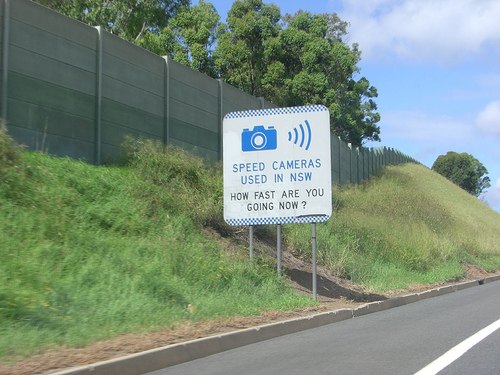


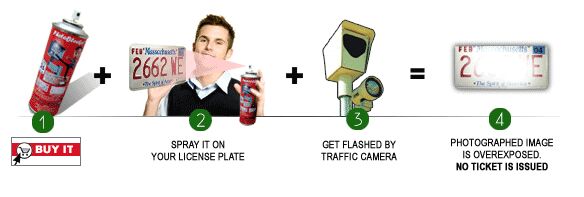

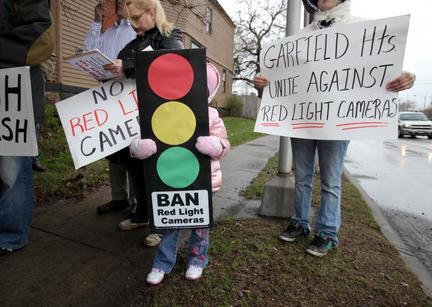
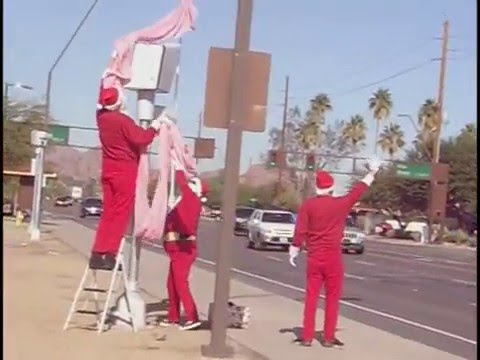
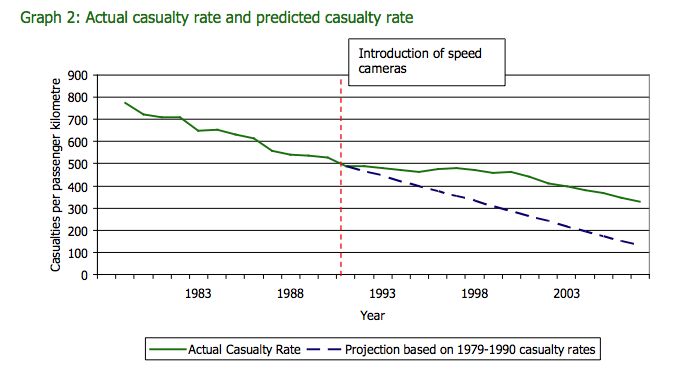
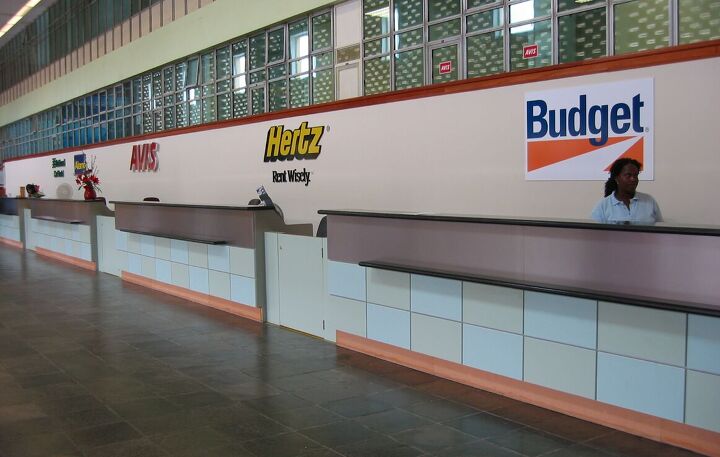
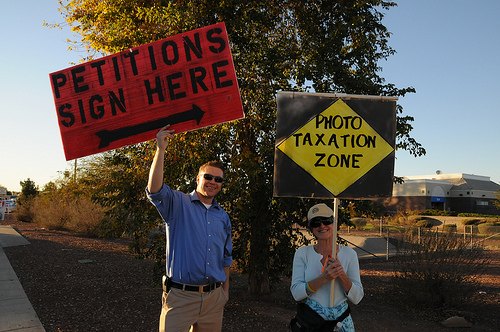












Recent Comments